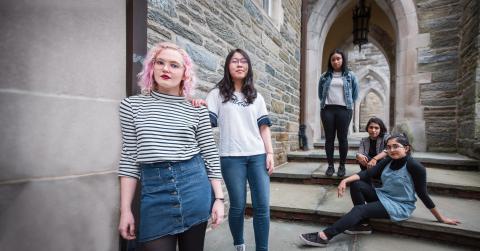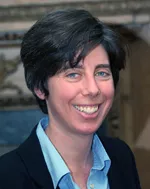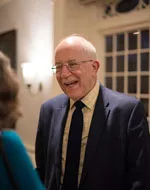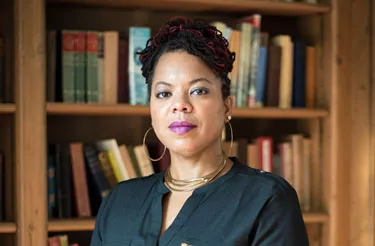For Starters: Winter 2018
Leadership. Preparing for the digital present. And saying goodbyes.

1. Meet the Leaders
This year’s SGA leaders rock. From left: Delia Landers ’19 (secretary) uses her position “to make every student’s voice heard.” Anna Huang ’19 (treasurer) supports on-campus organizations and events. Alisha Clark ’18 (president) has improved Plenary and the voting system, spearheaded a collaborative drive with Migrant Rights Coalition, and more. Nanda Bhushan ’19 (vice president) chairs the committee that appoints campus leaders. Swati Shastry ’18 (head of the Honor Board) facilitates and conducts hearings on the Honor Code's academic and social aspects.
2. Digital Service
“Digital instruction is most effective when it’s in the service of students’ individual interests and goals,” write President Kim Cassidy and Chief Information Officer Gina Siesing in a recent Inside Higher Ed piece.
Arguing for a broad-based education that encompasses all aspects of digital fluency, their article describes Bryn Mawr’s digital competencies initiative, which infuses digital skills into all aspects of education, including a wide array of co-curricular experiences.
“While colleges should include courses in programming, data visualization and statistics,” they write, “more students develop digital fluency more quickly and easily when digital tools are integrated throughout the curriculum—from classical and Near Eastern archaeology to behavioral economics.”
3. Farewell
Two Bryn Mawr veterans have departed this year as Lisa Saltzman headed to the Clark Art Institute in Williamstown, Massachusetts, and Dan E. Davidson celebrated a double retirement—from his position as CEO of the American Council of Teachers of Russian and as professor of Russian at Bryn Mawr.
Saltzman, now director of the Clark’s research and academic program, served in Bryn Mawr’s history of art department for 23 years. In her new role, she’s leading an international agenda of intellectual events and collaborations and overseeing the Clark’s residential fellows program.
Davidson, at Bryn Mawr for more than 40 years, founded the American Council in 1974 to expand the exchange of scholarship between the U.S. and the Soviet Union.
“We have to find a way to work effectively with the other countries in the world,” Davidson told an SRO crowd at his retirement celebration hosted by the American Council this fall. “That means investing in young people.”
Heeding that call, the American Council created the Dan E. Davidson Fellowship for students pursuing language and area studies and committed to contributing to mutual understanding and advancing successful international collaboration.
4. Just Ask
Responding to The New York Times article “As Glare Widens on Harassers, Men at Office Look in Mirror,” Amanda Wessel ’20 wrote: “I cannot believe that men in workplaces are turning to private group chats, consulting expensive lawyers, and considering canceling holiday parties before considering a very simple solution to many of their questions about sexual harassment: simply asking women, or anyone for that matter, if something is okay with them before doing it.”
5. Rugged, Long, & Lovely
Featured in Poets and Writers’ annual roundup of debut poets, Creative Writing’s Airea Matthews offered some writerly advice: “Listen to yourself, your hand, your gut, your pen, your mind. ... Your work has its own logic and its own tools; honor them. And, finally, wear comfortable shoes because the journey toward making the impossible possible is rugged, long, and lovely.”
6. 25 Going on 18
Think kids are growing up too fast?
According to a new study co-authored by Psychology Professor Heejung Park, you should think again.
Based on data from surveys conducted between 1976 and 2016, the study depicts a cohort of teenagers less likely to engage in adult activities than those of earlier generations.
The study shows a drop in alcohol use, sexual activity, dating, after-school employment, and even driving. Today’s high school students date less than their Boomer and GenX counterparts (56 percent vs. about 85 percent), have sex less (41 vs. 54 percent), and work after-school jobs less (55 vs. 77 percent). And what might be unimaginable to anyone who recalls begging for the car keys, more than 25 percent of today’s high school students still don’t have a driver’s license by the time they graduate.
The study was co-authored with Jean Twenge, professor of psychology at San Diego State University. Park’s research looks at how individuals and families around the world develop and negotiate values in the midst of social change and globalization.
7. History in the Making
“To write history is to make an argument by telling a story about dead people,” said Jill Lepore.
A Harvard historian and New Yorker writer, Lepore was speaking to Bryn Mawr’s first-years, as part of the Emily Balch Seminar programming.
Sharing her writing strategy, Lepore told students that writers should pursue only subjects that genuinely arouse their curiosity—or risk losing steam during the long research phase. The author of 10 books, Lepore has found her curiosity piqued by Benjamin Franklin’s sister (Book of Ages), the origin story of a comic book icon (The Secret History of Wonder Woman), and a long-lost manuscript purported to be the longest ever written (Joe Gould’s Teeth).
Published on: 03/16/2018


